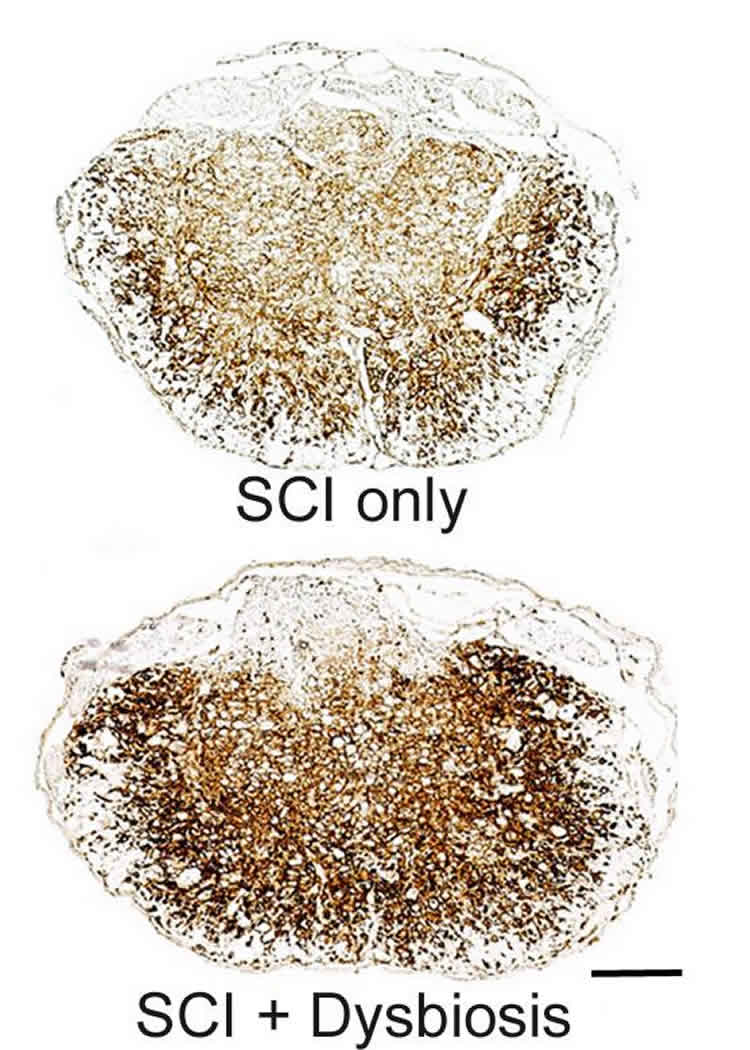Summary: A new study suggests certain probiotics could help aid patients’ recovery from spinal cord injury.
Source: Rockefeller University Press.
Researchers from The Ohio State University have discovered that spinal cord injury alters the type of bacteria living in the gut and that these changes can exacerbate the extent of neurological damage and impair recovery of function. The study, “Gut dysbiosis impairs recovery after spinal cord injury,” by Kristina A. Kigerl et al., which will be published online October 17 ahead of issue in The Journal of Experimental Medicine, suggests that counteracting these changes with probiotics could aid patients’ recovery from spinal cord injuries.
The trillions of bacteria that live in the gastrointestinal tract are collectively known as the gut microbiome. Disruption of this microbial community, or dysbiosis, occurs when nonpathogenic gut bacteria are depleted or overwhelmed by pathogenic inflammatory bacteria. Autoimmune diseases (including multiple sclerosis, type I diabetes, and rheumatoid arthritis) have been linked to dysbiosis, and it has been implicated in the onset or progression of neurological disorders, including autism, pain, depression, anxiety, and stroke.

Traumatic spinal cord injuries have secondary effects or comorbidities, including loss of bowel control, that are likely to cause dysbiosis. The authors reasoned that if any changes in the gut microbiome occur, they might, in turn, affect recovery after spinal cord injury.
Under the direction of Phillip G. Popovich at the Center for Brain and Spinal Cord Repair, the researchers found that spinal cord injury significantly altered the gut microbiome of mice, inducing the migration of gut bacteria into other tissues of the body and the activation of proinflammatory immune cells associated with the gut.
Mice that showed the largest changes in their gut bacteria tended to recover poorly from their injuries. Indeed, when mice were pretreated with antibiotics to disrupt their gut microbiomes before spinal cord injury, they showed higher levels of spinal inflammation and reduced functional recovery. In contrast, when injured mice were given daily doses of probiotics to restore the levels of healthy gut bacteria, they showed less spinal damage and regained more hindlimb movement.
The probiotics, containing large numbers of lactic acid-producing bacteria, activated a type of gut-associated immune cell–regulatory T cells–that can suppress inflammation. These cells could prevent excessive damage to the spinal cord after injury. Additionally, the probiotic bacteria may boost spinal cord recovery by secreting molecules that enhance neuronal growth and function. “Either or both of these mechanisms could explain how post-injury disruption of the gut microbiome contributes to the pathology of spinal cord injuries and how probiotics block or reverse these effects,” Popovich explains.
“Our data highlight a previously unappreciated role for the gut-central nervous system-immune axis in regulating recovery after spinal cord injury,” Popovich continues. “No longer should ‘spinal-centric’ repair approaches dominate research or standards of clinical care for affected individuals.”
Funding: The study was funded by the Craig H. Neilsen Foundation, Ray W. Poppleton Endowment, National Institutes of Health.
Source: Ben Short – Rockefeller University Press
Image Source: NeuroscienceNews.com image is credited to Kigerl et al., 2016.
Original Research: Abstract for “Gut dysbiosis impairs recovery after spinal cord injury” by Kristina A. Kigerl, Jodie C.E. Hall, Lingling Wang, Xiaokui Mo, Zhongtang Yu, and Phillip G. Popovich in JEM. Published online October 17 2016 doi:10.1084/jem.20151345
[cbtabs][cbtab title=”MLA”]Rockefeller University Press “Gut Bacteria May Aid Recovery From Spinal Cord Injury.” NeuroscienceNews. NeuroscienceNews, 17 October 2016.
<https://neurosciencenews.com/spinal-cord-injury-gut-bacteria-5303/>.[/cbtab][cbtab title=”APA”]Rockefeller University Press (2016, October 17). Gut Bacteria May Aid Recovery From Spinal Cord Injury. NeuroscienceNew. Retrieved October 17, 2016 from https://neurosciencenews.com/spinal-cord-injury-gut-bacteria-5303/[/cbtab][cbtab title=”Chicago”]Rockefeller University Press “Gut Bacteria May Aid Recovery From Spinal Cord Injury.” https://neurosciencenews.com/spinal-cord-injury-gut-bacteria-5303/ (accessed October 17, 2016).[/cbtab][/cbtabs]
Abstract
Gut dysbiosis impairs recovery after spinal cord injury
The trillions of microbes that exist in the gastrointestinal tract have emerged as pivotal regulators of mammalian development and physiology. Disruption of this gut microbiome, a process known as dysbiosis, causes or exacerbates various diseases, but whether gut dysbiosis affects recovery of neurological function or lesion pathology after traumatic spinal cord injury (SCI) is unknown. Data in this study show that SCI increases intestinal permeability and bacterial translocation from the gut. These changes are associated with immune cell activation in gut-associated lymphoid tissues (GALTs) and significant changes in the composition of both major and minor gut bacterial taxa. Postinjury changes in gut microbiota persist for at least one month and predict the magnitude of locomotor impairment. Experimental induction of gut dysbiosis in naive mice before SCI (e.g., via oral delivery of broad-spectrum antibiotics) exacerbates neurological impairment and spinal cord pathology after SCI. Conversely, feeding SCI mice commercial probiotics (VSL#3) enriched with lactic acid–producing bacteria triggers a protective immune response in GALTs and confers neuroprotection with improved locomotor recovery. Our data reveal a previously unknown role for the gut microbiota in influencing recovery of neurological function and neuropathology after SCI.
“Gut dysbiosis impairs recovery after spinal cord injury” by Kristina A. Kigerl, Jodie C.E. Hall, Lingling Wang, Xiaokui Mo, Zhongtang Yu, and Phillip G. Popovich in JEM. Published online October 17 2016 doi:10.1084/jem.20151345






